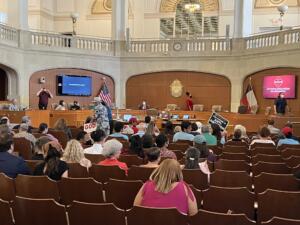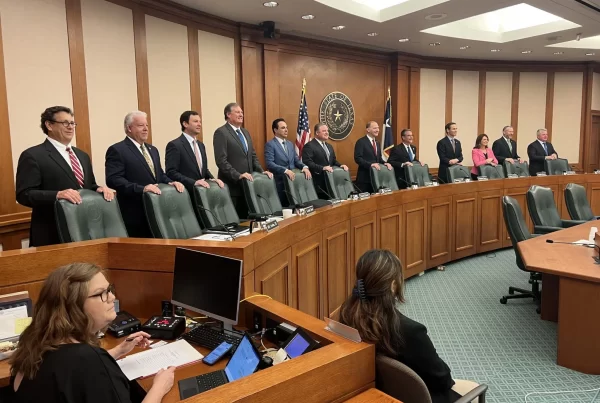Overview
The Texas Open Meetings Act (TOMA) is a state law designed to promote transparency in government by ensuring that meetings of governmental bodies in Texas are conducted openly and are accessible to the public. These bodies include city councils, commissioners courts, state boards and commissions, school boards, and university boards of regents. The law requires that most deliberations and actions be conducted in public, except for certain specified subjects that can be discussed in closed sessions.1
TOMA aims to ensure that citizens have the opportunity to observe and participate in public governance. By mandating that meetings be open, the Act enhances public accountability, allowing people to stay informed about government activities and voice their concerns or opinions on public policies.
Purpose of the Act
The primary goal of TOMA is to ensure that public business is conducted transparently and that governmental bodies are held accountable to the citizens they serve. It is rooted in the principle that the decision-making process should be open to scrutiny and that the public has a right to be involved in the democratic process.
The law covers a wide range of governmental bodies, from local government councils to state agencies, providing a uniform framework for public access to meetings. Through these provisions, TOMA seeks to foster an environment of transparency, giving the public the right to attend and participate in meetings where important decisions are made.
Public Notice Requirements
Under TOMA, governing bodies must provide written public notice of all meetings, including the time, place, and agenda items, at least 72 hours in advance of an open meeting.2 For state boards and commissions, the notice must be given seven days in advance. The notice must be posted in a place accessible to the public, such as on the government body’s website or at its physical location.3
The law defines a “meeting” as a gathering of a quorum (usually a majority, unless otherwise specified) of members to discuss public business or take official action.4 The definition includes deliberations between a quorum and a third party, such as staff members. If a quorum of members gathers in a private place and discusses public business, they risk violating the notice requirement if the discussion pertains to official matters.
Public Comment
Members of the public have the right to comment on agenda items at open meetings. Before the governing body discusses or takes action on any item, it must provide an opportunity for public input. The body may adopt reasonable rules to limit the amount of time an individual may speak on each item, but the public must be allowed to express their views. Importantly, governing bodies cannot prohibit criticism of the body or its actions.5
While the law allows governmental bodies to regulate the public comment period, it cannot stop members of the public from expressing criticism or voicing concerns about any policy, program, or procedure.
What Constitutes a “Meeting”
For TOMA to apply, a meeting must involve a quorum of the governing body discussing public business. Deliberations can occur in person, by telephone, or other means of communication. If a quorum of members is present, even informally, and they discuss public policy or business, the meeting must be open to the public unless an exception applies.
Private gatherings or events where a quorum of members discusses public business may violate TOMA if the gathering does not follow the proper public notice requirements.
Executive Sessions

Though most meetings are open, TOMA allows certain matters to be discussed in closed executive sessions.6 These sessions are confidential and can cover specific topics, such as:
- Contract negotiations
- Personnel matters
- Security issues
- Real estate negotiations or prospective donations that may be jeopardized by public discussion
- Individual student discipline matters (in the case of school boards)
All votes and final decisions, even those discussed in executive sessions, must be made in public. Governing bodies are also required to keep a certified agenda or recording of the executive session. However, these records are not typically available to the public unless ordered by a court if a violation of TOMA is alleged.
Enforcement and Penalties
If a governmental body violates TOMA, the public has the right to file a lawsuit against the body. In cases of TOMA violations, a judge may void any action taken during a meeting that was not conducted in compliance with the law. Additionally, penalties for violations may include fines, and if the violation was intentional, the governing body members could face criminal charges, including fines or even jail time.7
The law encourages transparency and discourages violations through the possibility of legal challenges, civil penalties, and criminal charges for willful violations. This enforcement mechanism helps maintain public trust in government decision-making.
Impact on Governance
The Texas Open Meetings Act plays a vital role in ensuring that government actions remain transparent and accessible to the public. By mandating that most meetings be open, TOMA allows citizens to stay informed about the decisions affecting their lives, voice concerns, and participate in the democratic process. Public comment periods and open meetings provide a forum for individuals to engage with their elected officials and hold them accountable.
However, TOMA faces challenges. Governmental bodies sometimes use executive sessions or informal meetings to circumvent the open meetings requirement. While TOMA provides strong protections for public access, the complexity of the law can sometimes lead to unintentional violations, particularly by smaller local governments with fewer resources.
Despite these challenges, the Texas Open Meetings Act remains a cornerstone of transparency in state and local governance, fostering an open and accountable system of government that helps ensure citizens have a direct role in shaping public policy.
Frequently Asked Questions
It depends on the rules set by the government body. The law says, “A governmental body may adopt reasonable rules regarding the public’s right to address the body under this section, including rules that limit the total amount of time that a member of the public may address the body on a given item” (Government Code sec. 551.007(c)).
Generally, yes. Courts have ruled that the 1st Amendment protects the display of banners at government meetings and the distribution of political pamphlets.
However, attendees cannot conduct themselves in a way that obstructs or interferes with the conduct of the meeting, whether by verbal utterance or physical interference. The Texas Penal Code makes this a Class B misdemeanor.
No. The Texas Open Meetings Act says, “A governmental body may not prohibit public criticism of the governmental body, including criticism of any act, omission, policy, procedure, program, or service.”


